Key takeaways
- Corporate lobbying significantly influences US politics by prioritizing corporate interests over public needs, often leading to an imbalance in legislative processes.
- The relationship-building strategies employed by lobbyists create a perceived advantage that regular citizens struggle to overcome, raising concerns about access and equality in democratic engagement.
- Lobbying practices are characterized by a lack of transparency, prompting questions about accountability and the true beneficiaries of political decisions.
- Understanding the long-term, strategic nature of lobbying reveals its deep structural effects on policy-making, complicating efforts for meaningful reform.
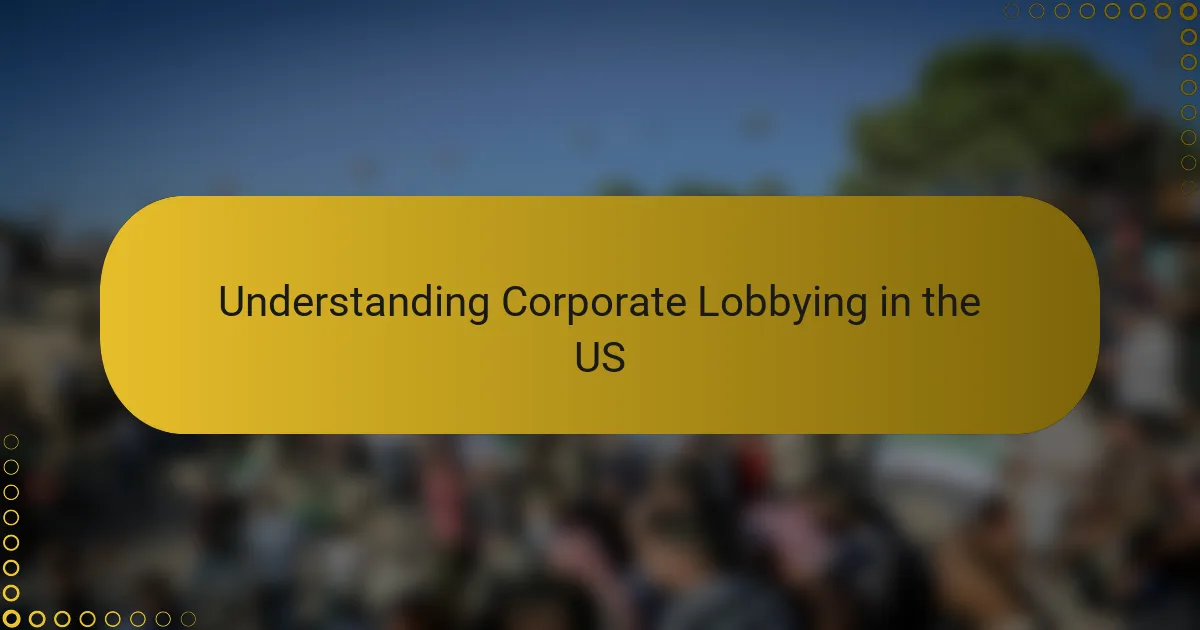
Understanding Corporate Lobbying in the US
When I first looked into corporate lobbying in the US, I was surprised by how deeply it’s woven into the political system. It’s not just about companies trying to influence laws; it’s a powerful tool that can shape policies affecting our daily lives. Have you ever wondered why some bills move swiftly through Congress while others stall indefinitely? To me, corporate lobbyists often hold the key.
One thing that struck me is how money and access are tightly linked in lobbying efforts. Corporations invest millions to gain face time with lawmakers, hoping to sway their decisions. This isn’t just professional advocacy—it’s a complex dance where influence, relationships, and sometimes opaque strategies play critical roles. It made me question whether the voices of regular citizens carry enough weight in this process.
Understanding the scale of lobbying also helped me see why debates about transparency and reform are so heated. Lobbyists operate within legal frameworks but often push ethical boundaries, leading to public distrust. From my perspective, this complexity demands a more informed conversation about how lobbying is regulated and who truly benefits from it. Don’t you think it’s important we dig deeper into who’s really calling the shots?
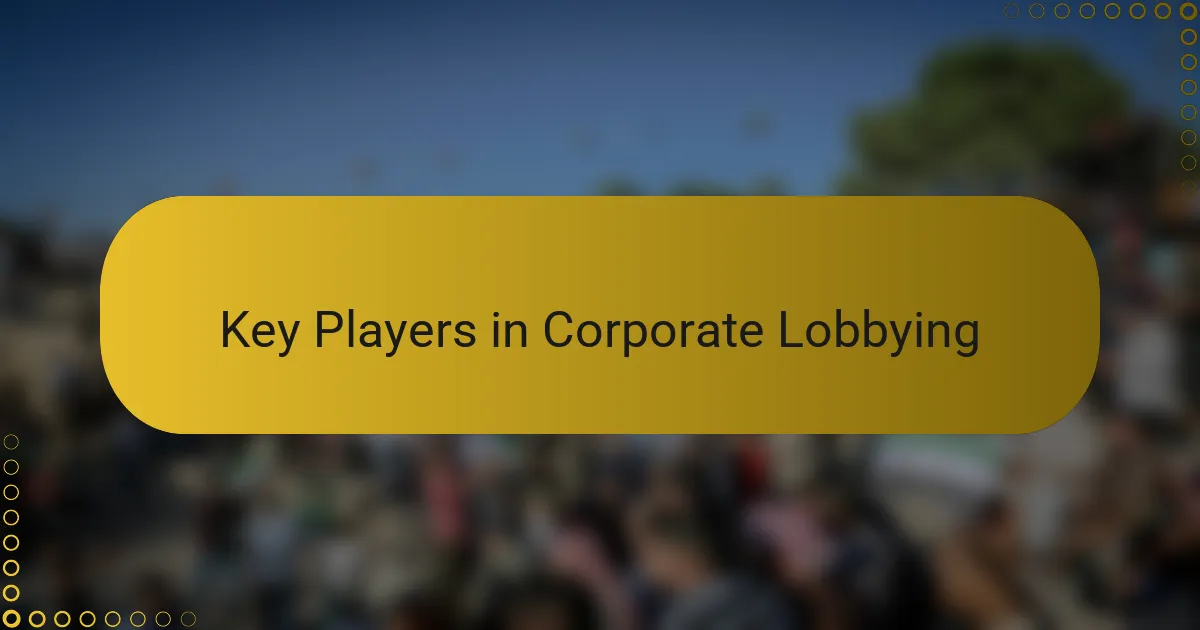
Key Players in Corporate Lobbying
When I dug into the key players behind corporate lobbying, it became clear that large corporations themselves are front and center. These companies often deploy well-funded teams of lobbyists who seem to have a direct line to influential lawmakers. It made me wonder—how does a regular citizen stand a chance when these powerful players are working behind the scenes to shape legislation?
Another group that caught my attention is the network of professional lobbyists, many of whom are former politicians or government officials. Their insider knowledge and connections create a kind of revolving door that perpetuates influence. I found this cycle fascinating yet troubling—does this close relationship blur the lines between public service and private gain?
Then there’s the role of trade associations and industry groups, which aggregate corporate interests to amplify their lobbying power. From what I’ve seen, they act almost like a collective voice that can sway entire sectors of policy. It’s striking how these players coordinate behind the scenes, often away from public scrutiny, raising the question: whose interests are really being served in these shadowy exchanges?
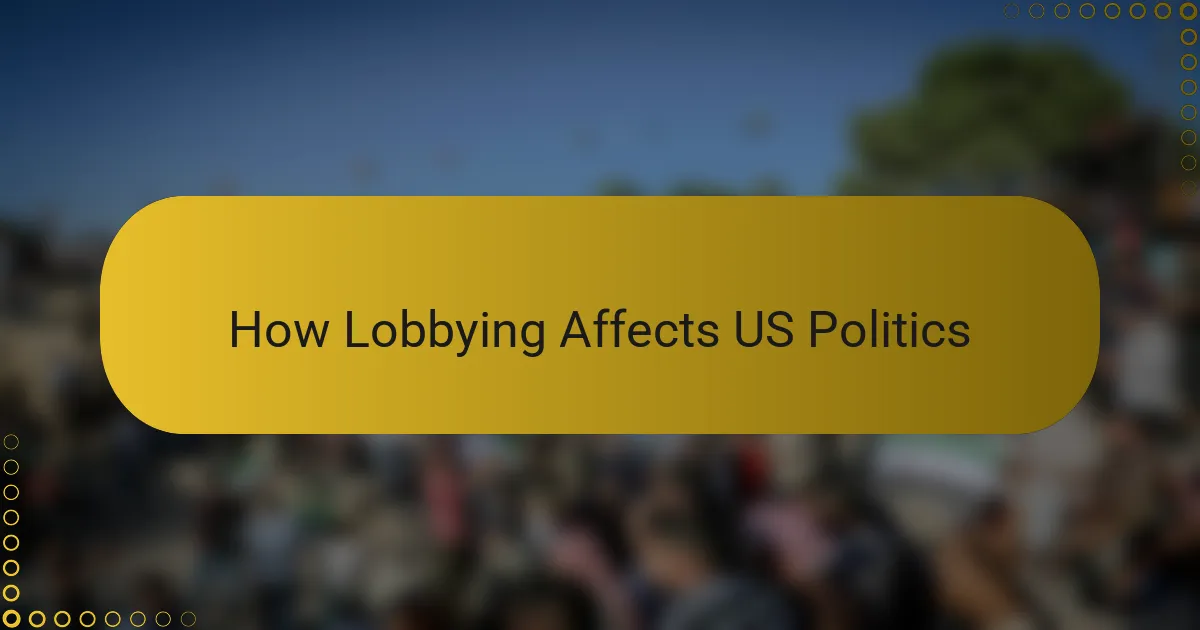
How Lobbying Affects US Politics
What really stood out to me about how lobbying affects US politics is the way it often tips the balance of power. When corporations spend heavily on lobbying, it seems like they’re buying more than just attention—they’re buying influence over laws that impact everyone. Have you ever felt that political decisions favor big business more than ordinary people? I’ve definitely sensed that imbalance while watching key policies unfold.
Another aspect I can’t ignore is how lobbying shapes the legislative agenda itself. Some bills get fast-tracked because they align with corporate interests, while others—sometimes public interest priorities—get left behind. It’s frustrating to see how lobbying can steer the direction of politics not based on merit, but based on who has the deepest pockets.
From my experience following US politics closely, lobbying also creates a kind of policy echo chamber. Lawmakers and lobbyists form relationships that reinforce specific viewpoints, often sidelining alternative perspectives. This makes me wonder: can we truly have a democratic process when the conversation is so influenced by those with vested interests? The whole system feels like a complex web where power is quietly negotiated far from public view.
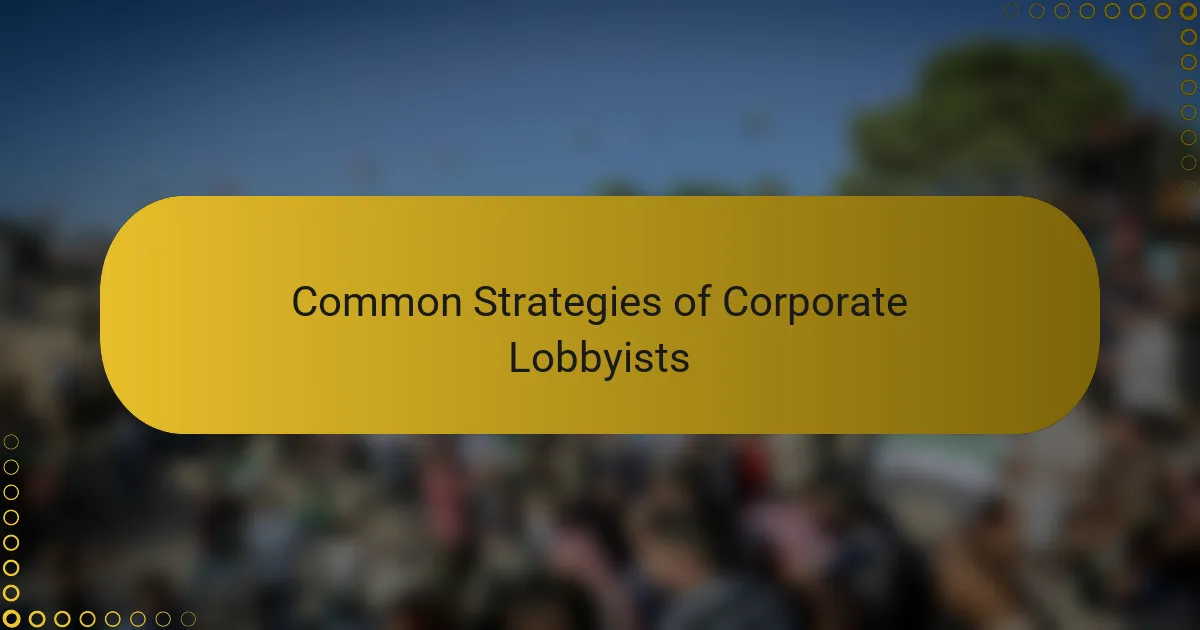
Common Strategies of Corporate Lobbyists
One strategy that jumped out to me is how corporate lobbyists constantly build personal relationships with lawmakers. It’s not just about presenting facts or making legal arguments; it’s about gaining trust and access over time. I remember thinking, isn’t it unfair that these connections often open doors that everyday citizens can’t even approach?
Another tactic I’ve noticed is the use of detailed research and data to back up their positions. Lobbyists come prepared with reports, statistics, and expert opinions designed to make their case seem not only persuasive but also essential. It made me question how much of this information is unbiased and how much is tailored to push a specific agenda.
Then there’s the heavy reliance on campaign contributions and political funding as a way to secure influence. From what I’ve learned, these financial ties create a sense of obligation that often nudges elected officials toward corporate interests. Have you ever wondered how much these donations shape the policies that affect all of us? I can’t help but feel this money-driven dynamic undermines the true spirit of democratic representation.
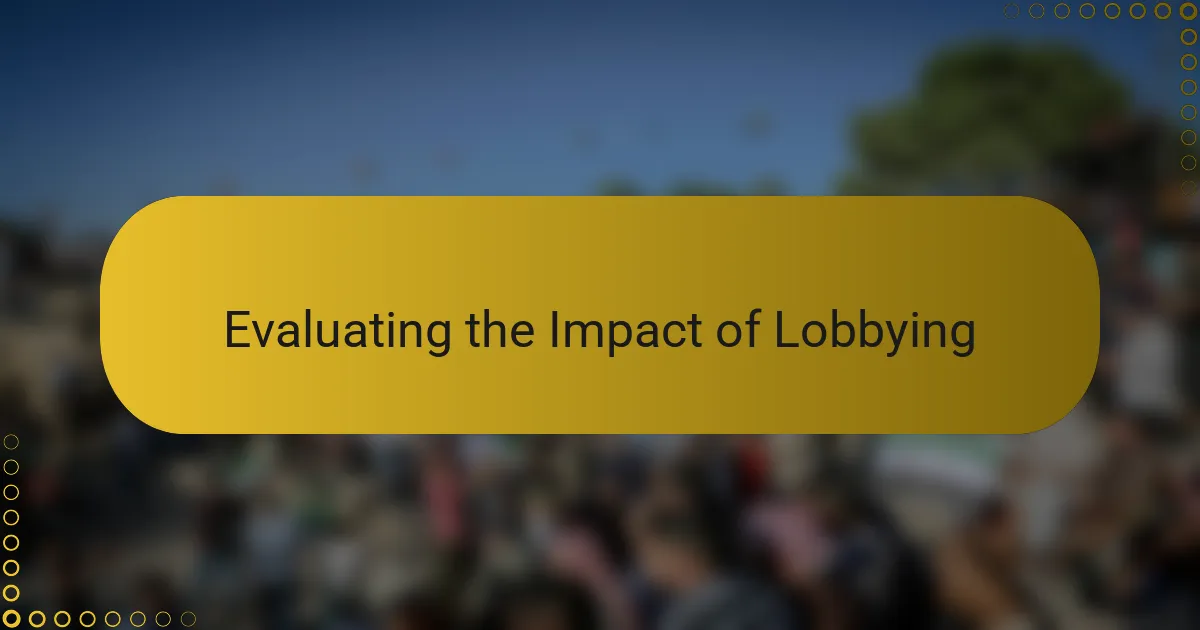
Evaluating the Impact of Lobbying
Evaluating the impact of lobbying made me realize how deeply it affects both the policy landscape and public trust. I’ve seen how the sheer volume of corporate lobbying can drown out ordinary voices, making it hard to tell if laws truly reflect the common good or just powerful interests. Does that not make you question who really benefits behind closed doors?
What surprised me most is how lobbying doesn’t just influence individual bills but shapes entire political priorities. From my perspective, this means the agenda itself can be skewed, favoring corporate wins over community needs. I often wonder how many important issues never get a fair shot because they lack the backing of well-funded lobbyists.
On a personal level, tracking these patterns has left me feeling uneasy about transparency in government. When influence is so carefully cultivated and exchanged, it’s tough to see where accountability ends. Can we expect a democratic process to work fairly if lobbying power remains so concentrated and opaque? I struggle with this question every time I follow the news.
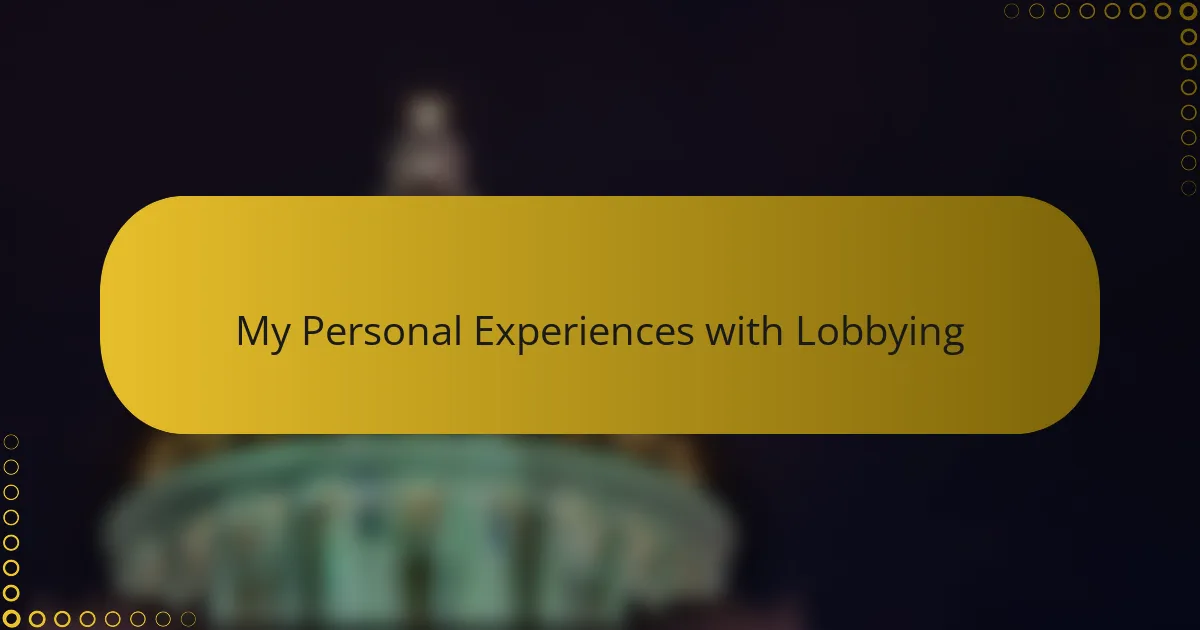
My Personal Experiences with Lobbying
I once had the chance to attend a congressional hearing where lobbyists from a major corporation were presenting their case. What struck me was how polished and confident they were, clearly accustomed to navigating the political maze. It made me wonder—how often do these encounters happen out of public sight, and what stories go untold?
In another instance, I reached out to a local representative’s office with a community concern, only to be redirected multiple times without clear answers. Observing lobbying in action afterward, I couldn’t help but feel the system favors those with money and connections far more than everyday citizens like me. Isn’t it disheartening when your voice feels lost in the noise?
From these experiences, I’ve come to realize that lobbying isn’t just about influence—it’s about access and opportunity. The deeper I look, the more I see that access often depends on relationships built over years, which I believe creates an uneven playing field. How can we bridge that gap so more voices are truly heard in shaping policy?
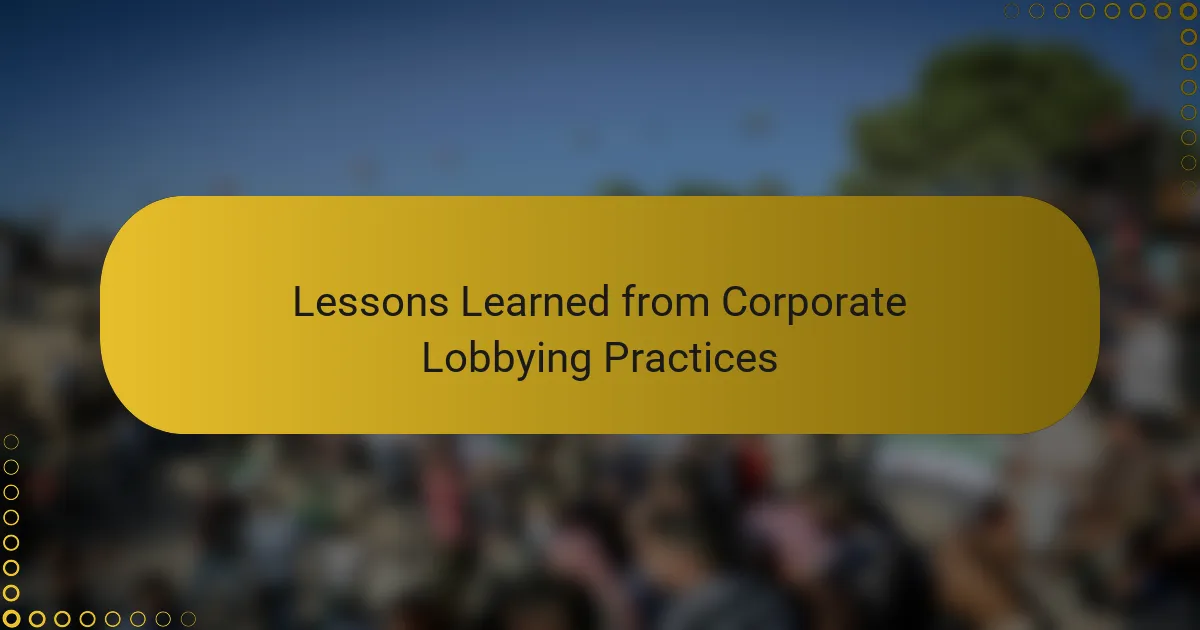
Lessons Learned from Corporate Lobbying Practices
One big lesson I’ve drawn from corporate lobbying practices is just how much patience and persistence play a role. It’s not all flashy or immediate; lobbyists often work quietly over years, nurturing relationships and positioning their interests strategically. It makes me wonder—how do these long games shape policies before anyone else even gets a chance to speak up?
Another insight I can’t shake is the contrast between transparency on paper and the reality behind closed doors. While lobbying is regulated, the actual influence often happens in subtle ways that aren’t easy to track. I’ve found myself asking: if these crucial conversations remain hidden, how can we hold anyone accountable for whose interests they’re truly serving?
Lastly, watching these practices over time has taught me that corporate lobbying isn’t just about pushing one bill or policy. It’s about setting an entire narrative and creating favorable conditions for future legislation. From my experience, this deep structural influence is what makes reform so difficult—it’s not just one battle but a continuous, evolving campaign that demands constant vigilance.